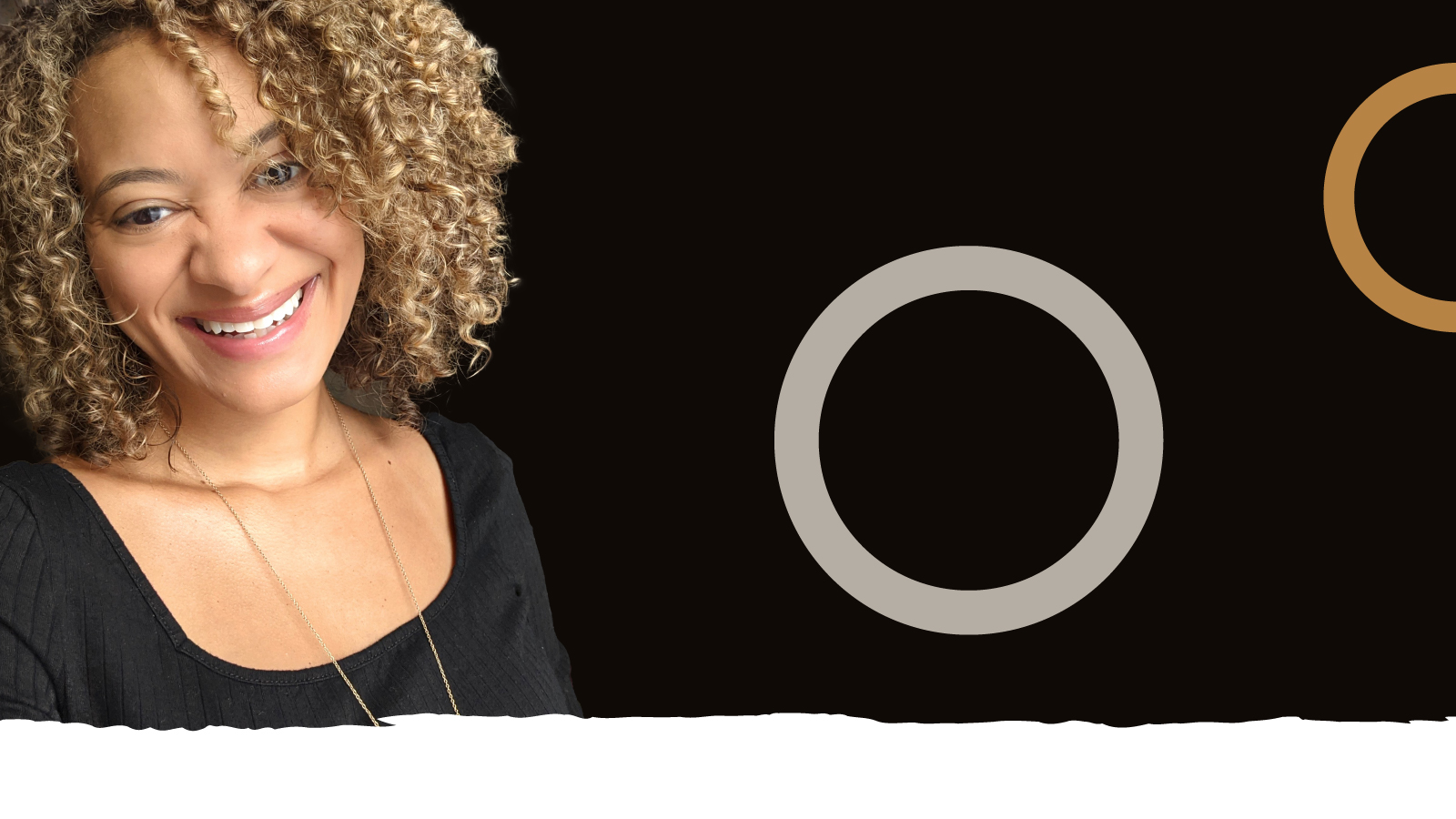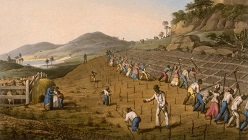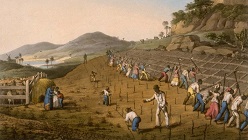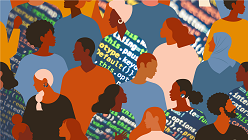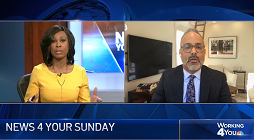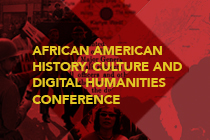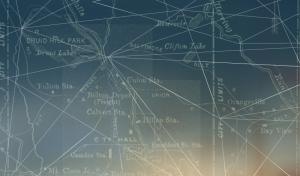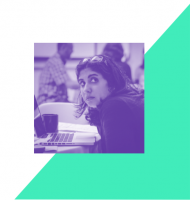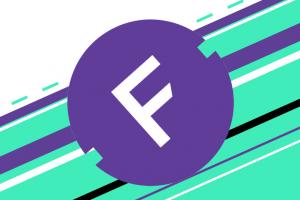By Jessica Weiss ’05
Fresh out of undergrad and working in advertising in Chicago in the late 2000s, Catherine Knight Steele found an online escape from her cubicle—in the blogosphere. Each day, she soaked up musings on topics ranging from gossip and entertainment to beauty and motherhood, written mainly by Black women. Not only did the content fascinate and enliven her, but it began to feel essential to her sense of personhood—like home.
Steele became so interested in these online spaces that she began to wonder whether she could pursue research on them. There weren’t many examples at the time of scholars of color working at the intersection of race and digital media, so Steele paved her own way, returning to graduate school for a Ph.D. in communication. Her dissertation, “Digital Barbershops,” focused on the politics of African American oral culture in online blog communities, tracing the ways that Black people have long found spaces outside the purview of the dominant group.
Now an associate professor of communication at UMD, Steele is committed to building community and expanding opportunities for a new generation of scholars in the burgeoning humanistic field of Black digital studies—the ways that technology impacts and intersects with Blackness and the lives, histories and cultures of Black Americans. Through her research and publications, collaborative projects and teaching, Steele wants people—and especially Black women—to know that if they’re interested in Black communication and technology, there’s a space at UMD for them.
“I’ve been very fortunate and privileged to get to this place, and now I have a sense of responsibility and a debt to pay to those on a similar path,” she said. “I want to help people find their people, find their passions and drive themselves forward in spaces they’ve been boxed out of.”
A native Chicagoan, Steele has long been interested in technology—but is the first to admit she’s not “techie” in a traditional sense. She remembers learning to type as a young girl using “Mavis Beacon Teaches Typing” on the family’s computer and was among the first batch of students to get Facebook in college, “back when you had to have a .edu address.” Mostly though, technology has been a tool to express herself and find belonging.
After she received her doctorate from the University of Illinois at Chicago in 2014, she served as an assistant professor at Colorado State University before coming to UMD in 2016 as the founding director of the Mellon-funded African American Digital Humanities Initiative (AADHum). The multi-year initiative encompasses research, education and training at the intersections of African American history, culture and the digital humanities—what’s often called Black digital humanities, or “BlackDH.” For three years, Steele and her team worked especially to create a community among those at the graduate and faculty levels in a range of disciplines and with varied interests. They organized workshops, panels and reading groups, hosted a conference, launched the first cohort of AADHum scholars and more.
“Catherine brought to life what was then a collection of plans and hopes,” said Trevor Muñoz, the director of the Maryland Institute for Technology in the Humanities and AADHum co-principal investigator. “She nurtured a scholarly community that encompassed and was genuinely interested in many different approaches to the study of Black life through and with technology.”
Steele dove back into her dissertation research, but with a renewed focus on Black women and Black feminists and how they’ve transformed technology over centuries. Using both historical and archival analysis and empirical Internet studies methods, Steele’s first book, “Digital Black Feminism,” was published in 2021 and offers a throughline from the writing of 19th-century Black women all the way to modern-day bloggers and social media creators. The book won the 2022 Nancy Baym Book Award from the Association of Internet Researchers (AoIR). In its announcement, AoIR said the book “reclaims feminism for Black women and directly intervenes in Internet scholarship.”
For Steele, the best part of publishing “Digital Black Feminism” has been the resultant conversations. From high school book clubs and a community college Black feminism course, to graduate programs in digital studies and feminist studies, it’s been used in “a variety of different generative spaces of conversation,” she said.
At UMD, Steele teaches courses on digital studies, media theory, methods in media and digital research, Black discourse and digital media and more. She recently became the director of Digital Studies in the Arts and Humanities, or DSAH, an interdisciplinary graduate certificate jointly administered by the College of Arts and Humanities and the Maryland Institute for Technology in the Humanities. She’s part of the inaugural cohort of the “Breaking the M.O.L.D.” initiative, which seeks to prepare underrepresented arts and humanities faculty from UMD, the University of Maryland, Baltimore County and Morgan State University for institutional leadership. And she’s working on three simultaneous collaborative book projects.
She was also recently named a Higher Ed IT “Influencer to Follow” by EdTech Magazine.
These days, Steele is focused on launching a new space on the third floor of the Skinner Building for anyone with an interest in Black digital studies. The Black Communication and Technology—or BCat—Lab will feature tables for workshops and writing sessions, a sofa and comfy chairs for reading from a Black digital studies library and a big screen for virtual workshops, lectures and events.
It’s part of the Mellon Foundation-funded Digital Inquiry, Speculation, Collaboration, & Optimism (DISCO) network, a collective of six scholars at institutions across the country that are “envisioning an alternative and inclusive digital future.” Each is leveraging their own areas of expertise to establish new research hubs, courses and more at their institutions. All the while, they are working together to share knowledge and experiences.
At UMD, the BCaT Lab will develop a program model to introduce undergraduates to digital research through workshops and coursework, help students carry out graduate research and find jobs and create a mentoring network for students and faculty to navigate Black digital studies, focusing on collaboration across generations of researchers.
Doctoral student Alisa Hardy, a graduate assistant at the lab and Steele’s advisee, has been working to spread the word about BCaT on campus and beyond. She said students—and Black students especially—are eager for a space to talk about technology, “and write together and learn together.”
“Working on the BCaT project has really fostered my own Black identity as a digital scholar,” Hardy said. “When I came to UMD, I wanted to study digital communication but I didn’t know if I had the tools, understanding or perspective. Working with Catherine has opened my mind up to so many other possibilities. Seeing this lab and how it's come to be—it’s inspiring. It makes me think I could do something similar one day.”
Among the lab’s upcoming events: BCaT will host a panel discussion this semester for early career scholars on writing a first book manuscript, which will feature published authors and an acquisition editor from a major academic press. Participants will then be invited to a weeklong workshop on writing the book proposal. It will also begin the “BCaT Writes Open Lab,” where undergraduate students, graduate students and faculty gather to write their own projects.
Eventually, Steele hopes to introduce students in Prince George’s County high schools to the field of Black digital studies and encourage future scholarship.
Her message for interested students: “There’s a place in the humanities where you can do what you want to do—where you can be of service to this community, and that’s in Black digital studies,” she said. “There is a wide range of possibilities with a graduate and undergrad degree with this background and skillset.”
“We need to show what that path looks like and provide branches along the way,” she added.
Steele will be in conversation with ARHU Dean Stephanie Shonekan on September 28, 2022, (on Zoom) to discuss “Digital Black Feminism” and how to marry digital research with historical and archival work as we consider a path for the humanities in the digital age. Learn more and sign up.

